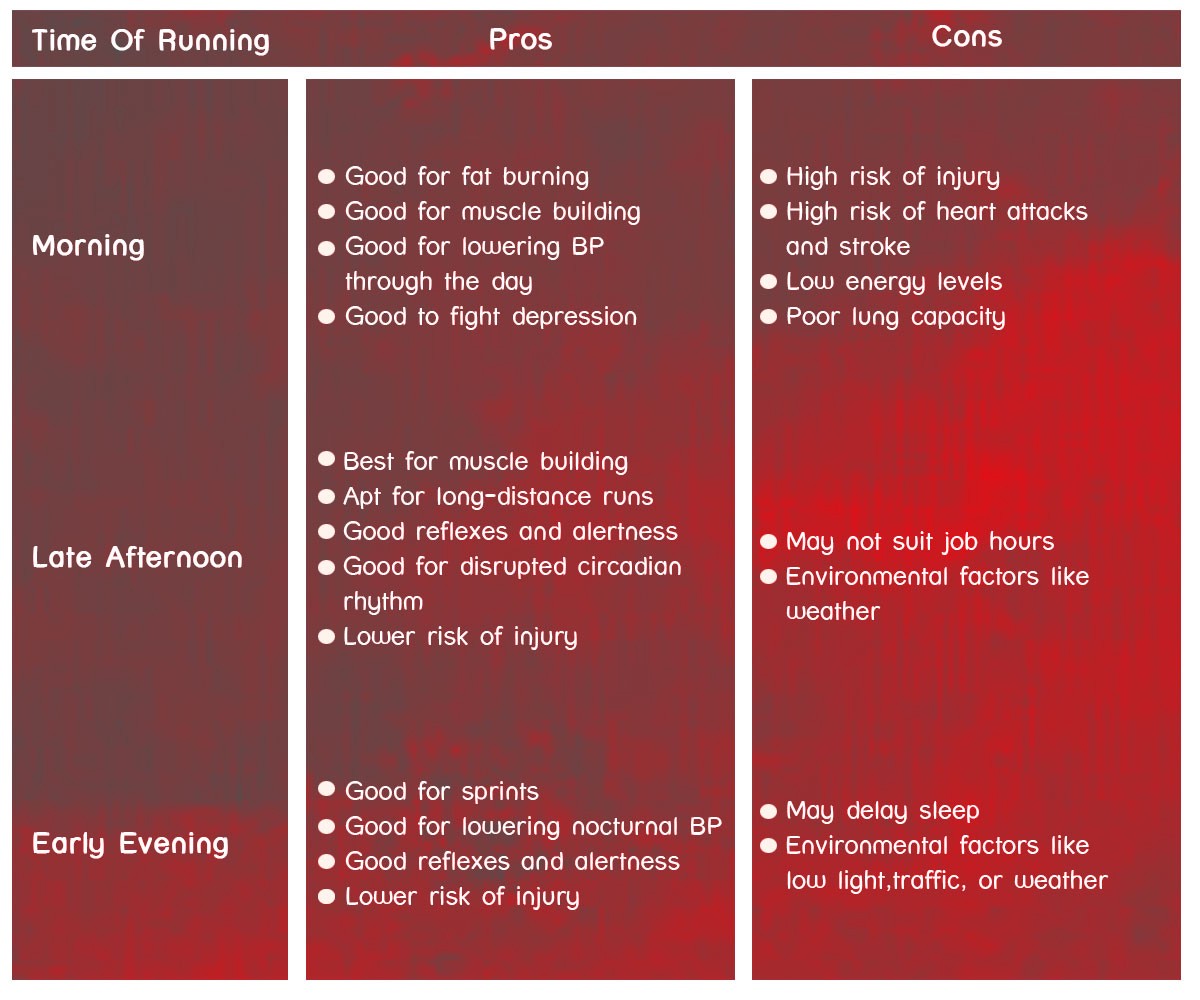
Running is one of the best things you can do for your body. From shedding weight to reducing the risk of heart issues and even improving your learning skills, running can do it all. But all these benefits may depend on the time of the run. So what is the best time to run?
The common running hours are early morning (6?7 am), late afternoon (3?5 pm), and evening (6?8 pm).
You glean the most out of your run when you go by your body clock or circadian rhythm (CR) ? a 24-hour pattern of rise and fall in your core body temperature, hormone levels, breathing capacity, reflex, strength, and energy stores. These factors, mainly your core body temperature, influence your run. The core body temperature peaks around 5 to 7 pm, starts dipping with sleep onset, and hits its lowest at 5 am, with a difference of 0.9 C.
The trick is to run when your core body temperature is high. Why? Because this will lead to:
- Increase in blood flow
- More oxygen and nutrition to muscles
- Better lubrication of joints
- More energy and stamina
- Low risk of injury
- Increase in speed of nerve impulse
- Better breakdown of glycogen and glucose
Here?s a detailed look at how the timing of the day can impact your running.
Is morning a good time to run?
Not many people prefer to run in the morning, because of the obvious reasons. But those who love morning runs say it gives them headspace ? the roads are free from traffic and noise, and in the absence of a harsh sun, the run is enjoyable. Here?s what you gain from a morning run.
1. You lose weight and eat less
Weight watchers vouch for a morning run without breakfast as the body starts burning up fat in the absence of carbs and proteins to burn for energy.
If you usually eat a high-fat, high-calorie diet, running in the morning on an empty stomach will prevent weight gain and improve your glucose tolerance.
Also, a morning workout has been seen to reduce one?s motivation for eating through the day. And it keeps you more physically active. But that also means you need to eat a good breakfast right after! Are you eating these foods after a run?
2. You build muscles
Early morning is a good time if you want to build your muscles. Testosterone, the hormone for muscle growth, peaks between 5:30 and 8 am. But you need to eat a good protein-rich breakfast after the run. Otherwise, you?ll end up losing muscle mass.
3. Your mood gets better and you can beat depression
Most patients of depression complain they feel the worst in the morning. This is because levels of cortisol, the stress hormone, are the highest in the morning at around 8 am. Running can help with depression as it helps release mood-lifting hormones called endorphins. And this may show a more pronounced effect in the morning. But running at any other point of the day can also beat depression.
4. You bring down your blood pressure
A study has shown that running in the morning (6?8 am) can bring down the systolic blood pressure (the first number in your BP reading) during the day in patients with hypertension. It also brings down the 24-hour BP in dippers ? patients whose blood pressure naturally dips at night.
If you have depression and high blood pressure, running in the morning can help. But a good warm-up is mandatory to avoid injuries or heart-related problems.
Another study on pre-hypertensive people proved that exercising at 7 am showed a 10% drop in blood pressure during the day and 25% during night. People who exercised at 7 in the morning also slept better than before.
Cons: Injury and heart problems
If you are not used to getting up early, you shouldn?t force yourself into a morning marathon. In any case, the core body temperature remains low during morning, which means that your muscles are stiff, your power output is low, and you are more vulnerable to injuries. Both your oxygen intake and outflow are low, and this can affect your breathing capacity.
Your blood pressure is also high. People are most vulnerable to heart attacks and strokes in the morning. But if you are a morning runner, follow this warm-up routine before you run.
What about late afternoon or early evening?
Science would suggest that late afternoon is the best time to run or to perform any kind of exercise. This is because helpful factors like core body temperature, hormone levels, breathing capacity, and reflex, all peak in the late afternoon. Space your lunch and your run judiciously, say by a couple of hours at least.
Go for a late afternoon run, 4 pm onward. During late afternoon and early evening, your body has the optimum core temperature, breathing capacity, alertness, and energy store. All of these help you run better and longer.
Early evening, too, is as good a time as late afternoon. You have got the day?s work out of the way and your energy levels are good enough to endure a sprint. Your flexibility, muscle strength, and short-term high-power output (think sprinting) peak in early evening close to the daily maximum in your core body temperature.
A higher core body temperature dilates the blood vessels, which ensures a better supply of nutrients and oxygen to the muscles. It also increases the speed of impulses from the nerves, which means you have increased alertness. This in turn improves the breakdown of glycogen and glucose to release more energy.
1. You build muscles better than morning runs
Afternoon runs build muscles better than morning runs do if you practice resistance training. As you know, both testosterone and cortisol levels are high in the morning, but the muscle-building effects of testosterone are negated by the muscle-wasting effects of cortisol at that time.
In the afternoon, the ratio of testosterone and cortisol is optimum for protein synthesis for muscle growth in response to resistance training. That means you can build better muscles by running outdoors or on an incline during the afternoon.
2. You run a lot longer
If you are training for long-distance runs, run in the afternoon. You have more fuel and peak lung capacity to sustain a longer run in the afternoon than in the morning. Afternoon runs help build your endurance as well.
3. You reduce the risk of injuries
Your raised core body temperature and energy stores ensure that your muscle strength and flexibility are at their peak during late afternoon. Also, your epinephrine and norepinephrine levels peak during noon. These make your heart pump and prepare you for a good run. These hormones also lower your pain sensation and boost your mood.
4. You fix a broken body clock
If you work in late-night shifts or travel across time zones, your circadian rhythm may be disrupted. Your body clock will not work according to natural day/night patterns, disrupting your sleep cycle. This can make you a likely victim of diabetes, obesity, and heart diseases.
If your sleep cycle is out of whack, run in the early evening to bring it back to normal rhythm.
A study on mice with a disrupted circadian rhythm showed that exercise fixed this problem, and exercises in the middle of their night ? which is equivalent to our afternoon ? had a stronger effect than those in the morning.
It is possible that running in the afternoon can help people, especially shift workers or the elderly, to regain their circadian rhythm.
5. You reduce your blood pressure
Evening too has some benefits. If you have high blood pressure, and it doesn?t go down at night like it should ? that is, you are a non-dipper ? exercise at 7 pm can reduce your systolic blood pressure at night. This benefit is seen more in non-dippers than in dippers. It?s also possible to lower diastolic blood pressure at night through evening exercise.
6. Running in the afternoon is risk-free
The cons of afternoon runs have nothing to do with your body. It could be the soaring temperature outside or it could be your inability to carve out an hour from your busy schedule. But if you can make the time, make sure you are well-hydrated and get some warm-up before you get going.
Cons: Late evening run may disturb your sleep
The one con an evening run has is that it might perk you up way too much to doze off. In that case, try pushing the run back by an hour.
Take a shower soon after the run to cool down and make your body ready for sleep.
The other deterrents include high levels of pollutants in the environment, a rapidly cooling weather ? adjusting to which might be difficult ? safety concerns, vision problem, and traffic issues. You could avoid these by going on an early evening run.
So, which is it?
Evening runs help lower your night-time blood pressure; and running in the late afternoon or early evening helps you improve your form and build muscles.
Science says the best time to run is late afternoon or early evening.
Also, while late afternoon is best for long-distance runs, early evening is best for sprints. If you are an athlete or someone intent on running longer, late afternoon and early evening are the best times for training as you are in your best shape at those points of the day. While running in the morning is the best time to run if you want to tackle depression or speed up weight loss.

BUT it?s more important to run when it suits you
Everybody is different. If you?ve been running at a fixed hour every day and are comfortable with it, that?s probably the best for you. Your body must have adjusted itself to that routine.
But yes, it?s important that you fix an hour and not throw your body off kilter with runs at random times of the day.


